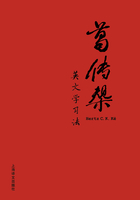
ABOUT COMPOSITION “DON’TS”
Books on composition contain some “don’ts” that are quite useless to Chinese students of English. For example,they advise the avoidance of slang;
of slang; but Chinese students do not know any slang and are of course in no danger of
but Chinese students do not know any slang and are of course in no danger of using any
using any in their composition.
in their composition.
But there are in such books some “don’ts” that are valuable to Chinese students,not as regards composition but as regards reading,such as the advice against the use of what is called the double negative. Both “I did not see anybody there” and “I saw nobody there” are good English,while “I did not see nobody there”,which contains a double negative,is bad English and should not be written. Well,Chinese students do not know anything about the double negative and so do not need the advice as given in many composition books. But when they read the advice,they learn something new,and they will not be at a loss when they come across a double negative in their reading. The double negative,by the way,is quite common in vulgar conversation.
conversation.
Reader,have you ever read a composition book? I find that there is much advice in such books that you — I mean the average Chinese student of English — cannot profit by. But,as I have said,there are some “don’ts” that will prove valuable to you as regards reading. You read readers and grammars,both of which are written in good English. But in modern drama
But,as I have said,there are some “don’ts” that will prove valuable to you as regards reading. You read readers and grammars,both of which are written in good English. But in modern drama and fiction
and fiction there are usages outside of
there are usages outside of good English. Such usages are to be avoided in composition,but are often very useful in reproducing
good English. Such usages are to be avoided in composition,but are often very useful in reproducing uneducated speech in drama and fiction;and of course you must understand them before you can read intelligently what contains such. Composition books pillory
uneducated speech in drama and fiction;and of course you must understand them before you can read intelligently what contains such. Composition books pillory some of such bad usages to warn you not to use them,but you,who know nothing but good English,will profit by the “don’ts” in a way not intended by the authors of these books.
some of such bad usages to warn you not to use them,but you,who know nothing but good English,will profit by the “don’ts” in a way not intended by the authors of these books.